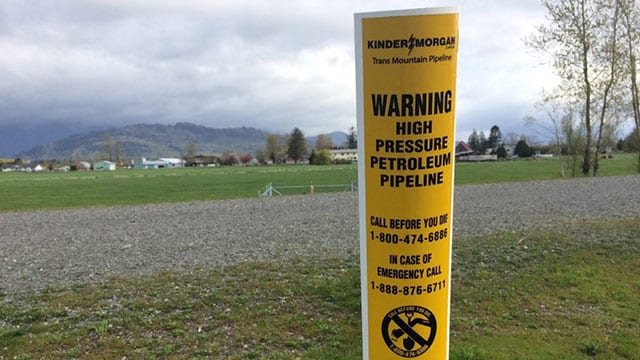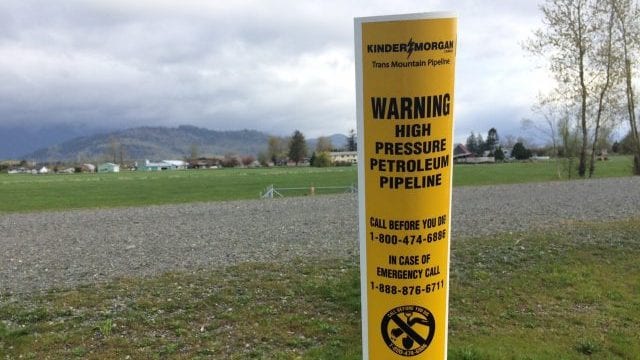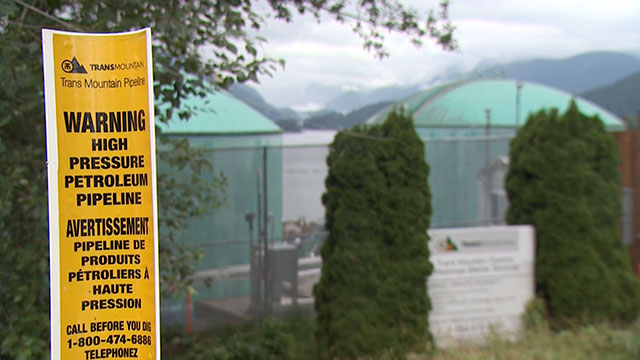
The existing Trans Mountain pipeline crosses a river in Chilliwack, B.C., near Cheam First Nation. Lucy Scholey/APTN

The Canadian Press
The governments of Alberta and Saskatchewan are urging the Federal Court of Appeal to defer to cabinet’s approval of the Trans Mountain pipeline because they say Indigenous opposition shouldn’t outweigh other public interests in the project.
Alberta and Saskatchewan are acting as interveners at a hearing in Vancouver about whether Indigenous groups were meaningfully consulted during a new round of dialogue about the $10 billion project.
The court heard from four Indigenous groups from British Columbia who argue the government already had an outcome in mind when it engaged them and the consultations were therefore inadequate.
Lawyers for the federal government and Trans Mountain Corp. have countered that the Indigenous groups did not approach the consultations in good faith and their applications should be dismissed.
Stephanie Latimer, who represents Alberta’s attorney general, says there is an “ongoing lack of certainty” about what constitutes reasonable Crown consultation and accommodation in the context of complex, multi-phase projects like Trans Mountain.
But she says the court could increase certainty for investors, provinces and other interested parties through judicial deference to cabinet, which she says is well positioned to make decisions weighing the vast and varied opinions on such projects.
“Judicial deference helps create certainty by demonstrating respect both for the decision-making process as well as Parliament,” she said.
With the development of the duty to consult and accommodate, Indigenous Peoples now have an important voice in resource development. She said the Crown has every motivation to ensure consultation is adequate, but perfect satisfaction is not required.
“In some cases, this will require the governors in council to make decisions that do not meet the expectations of Indigenous communities, but that does not mean the decision was not reasonable,” Latimer told the court. “Compromise is inherent in the reconciliation process.”
James Fyfe, representing Saskatchewan’s attorney general, told the court that, as a land-locked province, Saskatchewan relies on pipelines like Trans Mountain to reap the benefits of its oil and gas resources, he said.

(The pipeline starts in Edmonton, Alta., and end on the West Coast of British Columbia in Burnaby. APTN file)
Reconciliation should not be allowed to unduly interfere with other rights, such as provincial jurisdiction over natural resources, he argued.
“We ask the court to be sensitive to the very practical concern that if courts too readily interfere with project proposals, proponents may be deterred from bringing them forward,” he said.
Prime Minister Justin Trudeau’s government has twice approved a plan to triple the capacity of the pipeline from Alberta’s oilsands to a shipping terminal in Metro Vancouver.
Several First Nations, environmental groups and the City of Vancouver had originally filed challenges making a range of arguments including that the project threatens southern resident killer whales.
The court allowed six First Nations to proceed with an expedited hearing focused on the federal government’s consultation with Indigenous communities between August 2018 and June 2019.
Two First Nations have since dropped out of the appeal after signing deals with Trans Mountain Corp.
On Monday and Tuesday, Indigenous groups argued in court that the consultation process was rushed, they were sometimes given only days to respond to major proposals related to the project, and key information was withheld from them.
They also pointed to Prime Minister Justin Trudeau’s public statements that the pipeline is in the national interest before the consultations were complete as evidence that dialogue was not conducted in good faith.
On Wednesday, a lawyer for Trans Mountain Corp. defended the government’s consultation with Indigenous groups over the Crown corporation’s operation and construction of its pipeline.
Maureen Killoran said the latest round of consultations built on more than six years of work by Trans Mountain to engage with Indigenous groups and other affected communities, and that will continue through the project life cycle.
Arguments by the Tsleil-Waututh Nation, Squamish Nation, Coldwater Indian Band and a coalition of small First Nations in the Fraser Valley should be dismissed, she said.
Killoran argued that the same groups failed to engage with Trans Mountain in good faith or at all and are relitigating issues that were raised in the original case or have taken positions that are effectively a veto against the project.
“We say that such defences serve as a complete bar to the applicants in this case,” she said.
Killoran alleged Trans Mountain was excluded from meetings with the Squamish and Tsleil-Waututh nations, and accused Coldwater of delaying Trans Mountain from initiating an aquifer study that the First Nation had said was essential.
The existing pipeline runs through the Coldwater reserve and the First Nation has expressed concerns about impacts to the aquifer that supplies its drinking water.
When asked by one of the judges if she thinks a failure to engage with Trans Mountain, which is now a Crown corporation, constitutes a failure to engage with the Crown, Killoran responded that it is.
“A failure to engage the proponent and take advantage of those opportunities is absolutely a failure to engage,” she said.










